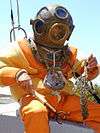Hydrogen narcosis
Hydrogen narcosis (also known as the hydrogen effect) is the psychotropic state induced by breathing hydrogen at high pressures. Hydrogen narcosis produces symptoms such as hallucinations, disorientation, and confusion, which are similar to hallucinogenic drugs. It can be experienced by deep-sea divers who dive to 300 metres (1,000 ft) below sea level breathing hydrogen mixtures.[1] However, hydrogen has far less narcotic effect than nitrogen (which causes the better known nitrogen narcosis) and is very rarely used in diving. In tests of the effect of hydrogen narcosis, where divers dived to 500 metres (1,600 ft) with a hydrogen–helium–oxygen (Hydreliox) mixture containing 49% hydrogen, it was found that while the narcotic effect of hydrogen was detectable, the neurological symptoms of high-pressure nervous syndrome were only moderate.[2][3]
See also
References
- ↑ Taylor, Larry "Harris". "Diving With Gas Mixes Other Than Air". Retrieved 2009-03-02.
- ↑ Abraini, JH; Gardette-Chauffour, MC; Martinez, E; Rostain, JC; Lemaire, C (1994). "Psychophysiological reactions in humans during an open sea dive to 500 m with a hydrogen-helium-oxygen mixture". Journal of Applied Physiology. American Physiological Society. 76 (3): 1113–8. ISSN 8750-7587. PMID 8005852. Retrieved 2009-03-01.
- ↑ Rostain, JC; Gardette-Chauffour, MC; Lemaire, C; Naquet, R (1988). "Effects of a H2-He-O2 mixture on the HPNS up to 450 msw.". Undersea Biomedical Research. 15 (4): 257–70. ISSN 0093-5387. OCLC 2068005. PMID 3212843. Retrieved 2009-03-02.
